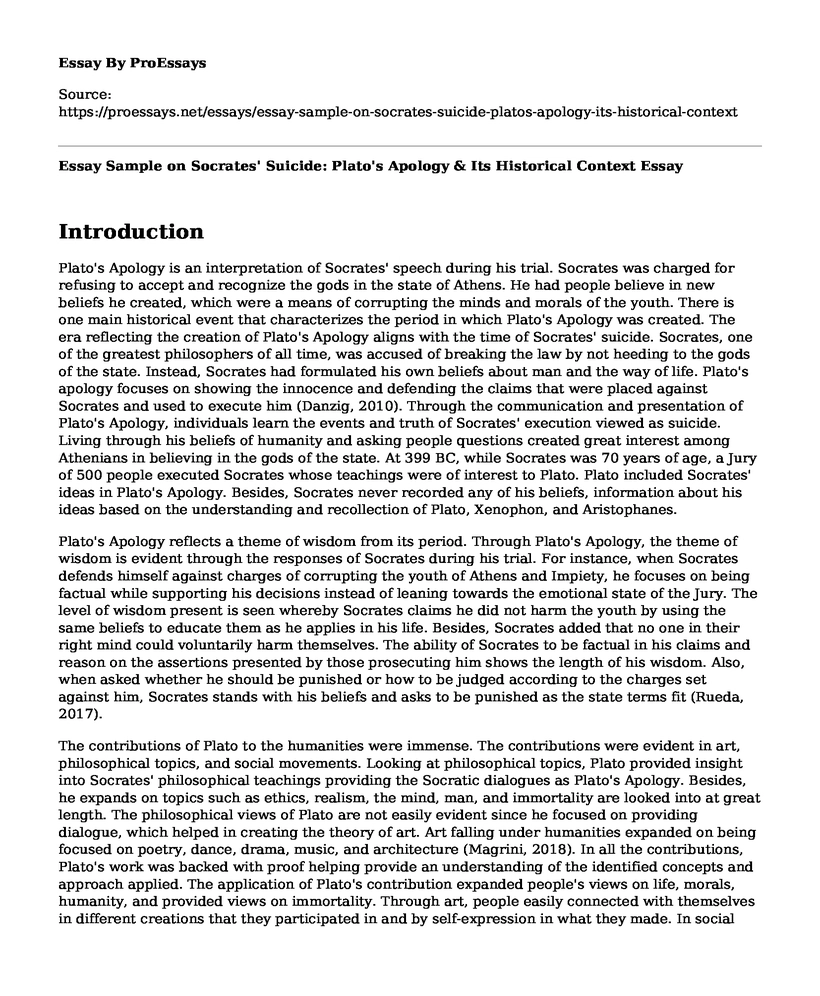Introduction
Plato's Apology is an interpretation of Socrates' speech during his trial. Socrates was charged for refusing to accept and recognize the gods in the state of Athens. He had people believe in new beliefs he created, which were a means of corrupting the minds and morals of the youth. There is one main historical event that characterizes the period in which Plato's Apology was created. The era reflecting the creation of Plato's Apology aligns with the time of Socrates' suicide. Socrates, one of the greatest philosophers of all time, was accused of breaking the law by not heeding to the gods of the state. Instead, Socrates had formulated his own beliefs about man and the way of life. Plato's apology focuses on showing the innocence and defending the claims that were placed against Socrates and used to execute him (Danzig, 2010). Through the communication and presentation of Plato's Apology, individuals learn the events and truth of Socrates' execution viewed as suicide. Living through his beliefs of humanity and asking people questions created great interest among Athenians in believing in the gods of the state. At 399 BC, while Socrates was 70 years of age, a Jury of 500 people executed Socrates whose teachings were of interest to Plato. Plato included Socrates' ideas in Plato's Apology. Besides, Socrates never recorded any of his beliefs, information about his ideas based on the understanding and recollection of Plato, Xenophon, and Aristophanes.
Plato's Apology reflects a theme of wisdom from its period. Through Plato's Apology, the theme of wisdom is evident through the responses of Socrates during his trial. For instance, when Socrates defends himself against charges of corrupting the youth of Athens and Impiety, he focuses on being factual while supporting his decisions instead of leaning towards the emotional state of the Jury. The level of wisdom present is seen whereby Socrates claims he did not harm the youth by using the same beliefs to educate them as he applies in his life. Besides, Socrates added that no one in their right mind could voluntarily harm themselves. The ability of Socrates to be factual in his claims and reason on the assertions presented by those prosecuting him shows the length of his wisdom. Also, when asked whether he should be punished or how to be judged according to the charges set against him, Socrates stands with his beliefs and asks to be punished as the state terms fit (Rueda, 2017).
The contributions of Plato to the humanities were immense. The contributions were evident in art, philosophical topics, and social movements. Looking at philosophical topics, Plato provided insight into Socrates' philosophical teachings providing the Socratic dialogues as Plato's Apology. Besides, he expands on topics such as ethics, realism, the mind, man, and immortality are looked into at great length. The philosophical views of Plato are not easily evident since he focused on providing dialogue, which helped in creating the theory of art. Art falling under humanities expanded on being focused on poetry, dance, drama, music, and architecture (Magrini, 2018). In all the contributions, Plato's work was backed with proof helping provide an understanding of the identified concepts and approach applied. The application of Plato's contribution expanded people's views on life, morals, humanity, and provided views on immortality. Through art, people easily connected with themselves in different creations that they participated in and by self-expression in what they made. In social movements, Plato provided important virtues abiding by the four cardinal Grecian virtues, including temperance, courage, wisdom, and justice.
References
Danzig, G. (2010). Apologizing for Socrates: How Plato and Xenophon created our Socrates. Lexington Books.
Magrini, J. M. (2018). Epilogue: Learning from Plato's Socrates. In Plato's Socrates, Philosophy and Education (pp. 103-121). Springer, Cham.
Rueda, C. R. G. (2017). The Wisdom in the Apology of Plato. Philosophy, 7(1), 39-43.
Cite this page
Essay Sample on Socrates' Suicide: Plato's Apology & Its Historical Context. (2023, Mar 27). Retrieved from https://proessays.net/essays/essay-sample-on-socrates-suicide-platos-apology-its-historical-context
If you are the original author of this essay and no longer wish to have it published on the ProEssays website, please click below to request its removal:
- How (Un)ethical Are You: Hiring Department Essay
- Essay Example on Personal Identity: Locke vs Reid Debate
- Essay Example on My Culture: Shaping My Behaviors & Adaptive Traits
- Essay Example on Military Immunizations: Ethical Implications?
- Essay Example on Are Humans Naturally Good or Bad?
- Paper Example on Economics: Does It Encourage or Discourage Moral Virtue?
- Fostering Customer Loyalty: Building Trust and Addressing Ethical Obligations in Busines - Free Paper







